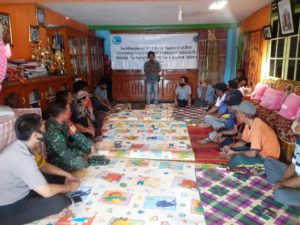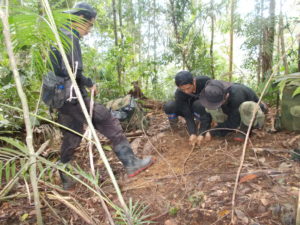Mentoring hunters and recidivists (previous offenders) is just one of the activities included in this latest Lingkar Institute report.
Lingkar Institute follow the premise that Islamic values can be used to support conservation and protect nature. In 2014 the FATWA issued by the Muslim Council of Indonesia against the hunting and killing of endangered animals is used as an example to protect Sumatran tigers. Conservation education is delivered to local religious leaders who share these positive messages and further information to congregations in the forest-edge villages south of Kerinci Seblat National Park.
Additionally, Lingkar Institute builds stronger relationships with communities who in return assist in the protection of the forests from poachers. Antipoaching response teams have been established with team members from the forestry service, National Park rangers and the local community. They are able to respond quickly to reports of illegal or unknown activities in the forest to prevent poaching.
Despite the arrival of the COVID-19 pandemic Lingkar Institute report that it was able to carry out most of its planned activities.
Activities and achievements February – July 2020:
- Three villages; Suka Datang, Teluk Dien and Ketong Jaya Village in Lebong and North Bengkulu District have been educated about the FATWA MUI No. 04/2014.
- Mentoring recidivists started in July and 15 perpetrators have been visited at least twice by specially trained staff.
- Regular meetings with Indonesia Council of Islamic Scholars (MUI) leaders and administrators in Lebong and North Bengkulu district were held, although in restricted condition.
- An extension to the existing MOU was signed by the Kerinci Seblat National park and the Director of the Lingkar Institute. This collaboration is valid for the next three years, namely 2020-2023.
- Seven patrols were conducted by the SMART Patrol Team covering 199 km in 36 days in the field. 23 indications of Sumatran tigers were encountered on 5 of the seven routes that they took.
- 5 inactive traps, three active nylon snares, one active rattan trap and 28 passive glue traps were confiscated. The majority of traps were targeted at wild birds.
- 13 former roofed huts made of plastic or leaf used by bird catchers or hunters were discovered and dismantled.
- Wildlife Crime Investigations did not uncover any new hunters who are actively hunting Sumatran Tigers. Investigators only received information related to prey animals such as deer, antelope and forest goats.
- No incidents of human-wildlife conflict were attended during this period.
- Due to COVID-19, conservation education training in schools could not be carried out during this first 6 months.




